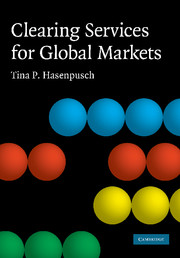 Clearing Services for Global Markets
Clearing Services for Global Markets Book contents
- Frontmatter
- Contents
- List of figures
- List of abbreviations
- Acknowledgements
- Foreword
- 1 Introduction
- 2 Setting the stage – definitions and industry setting
- 3 Defining the core issues – efficiency and network strategies
- 4 Collecting empirical insights – introduction to the empirical study
- 5 Analysing costs of derivatives clearing – transaction cost studies
- 6 Exploring theoretical basics – scale effects in clearing
- 7 What theory reveals – framework for efficiency analysis of network strategies
- 8 Checking theory against reality – case studies of network strategies
- 9 Quantifying the efficiency impact – European network strategies
- 10 Introducing the future network economy – development of the clearing industry
- 11 Summary, discussion and recommendations for future research
- Appendices
- Bibliography
- Index
8 - Checking theory against reality – case studies of network strategies
Published online by Cambridge University Press: 19 January 2010
- Frontmatter
- Contents
- List of figures
- List of abbreviations
- Acknowledgements
- Foreword
- 1 Introduction
- 2 Setting the stage – definitions and industry setting
- 3 Defining the core issues – efficiency and network strategies
- 4 Collecting empirical insights – introduction to the empirical study
- 5 Analysing costs of derivatives clearing – transaction cost studies
- 6 Exploring theoretical basics – scale effects in clearing
- 7 What theory reveals – framework for efficiency analysis of network strategies
- 8 Checking theory against reality – case studies of network strategies
- 9 Quantifying the efficiency impact – European network strategies
- 10 Introducing the future network economy – development of the clearing industry
- 11 Summary, discussion and recommendations for future research
- Appendices
- Bibliography
- Index
Summary
The previous chapter delivers preliminary findings regarding the impact of network strategies on the efficiency of clearing; this chapter challenges these conclusions with findings from the empirical study and real-world case studies. In the following, a case study analysis is performed for each of three types of network strategy: clearing links (including cross-margining agreements), mergers and acquisitions, and a Single CCP.
As the centre of the analysis is on the European clearing industry, the selected case studies focus on network strategies that involve European clearing houses. The clearing link study (section 8.1) presents findings from the empirical study concerning cross-margining agreements and clearing links and analyses the link established in 2003 between Eurex Clearing (a Frankfurt-based clearing house) and the Clearing Corporation (a Chicago-based clearing house). The mergers and acquisitions study (section 8.2) examines the merger between the London Clearing House (LCH) and Clearnet (a Paris-based clearing house) in 2003, which produced LCH.Clearnet. In contrast to the other two case studies, the Single CCP study (section 8.3) deals with a hypothetical scenario: the creation of a single clearing house for Europe.
Each case analysis mines the interviewees' perceptions of the respective network strategy in terms of its overall benefits and constraints. Additionally, the interviewees' feedback regarding the suitability of clearing links or a Single CCP to integrate European clearing is presented.
- Type
- Chapter
- Information
- Clearing Services for Global MarketsA Framework for the Future Development of the Clearing Industry, pp. 285 - 392Publisher: Cambridge University PressPrint publication year: 2009


